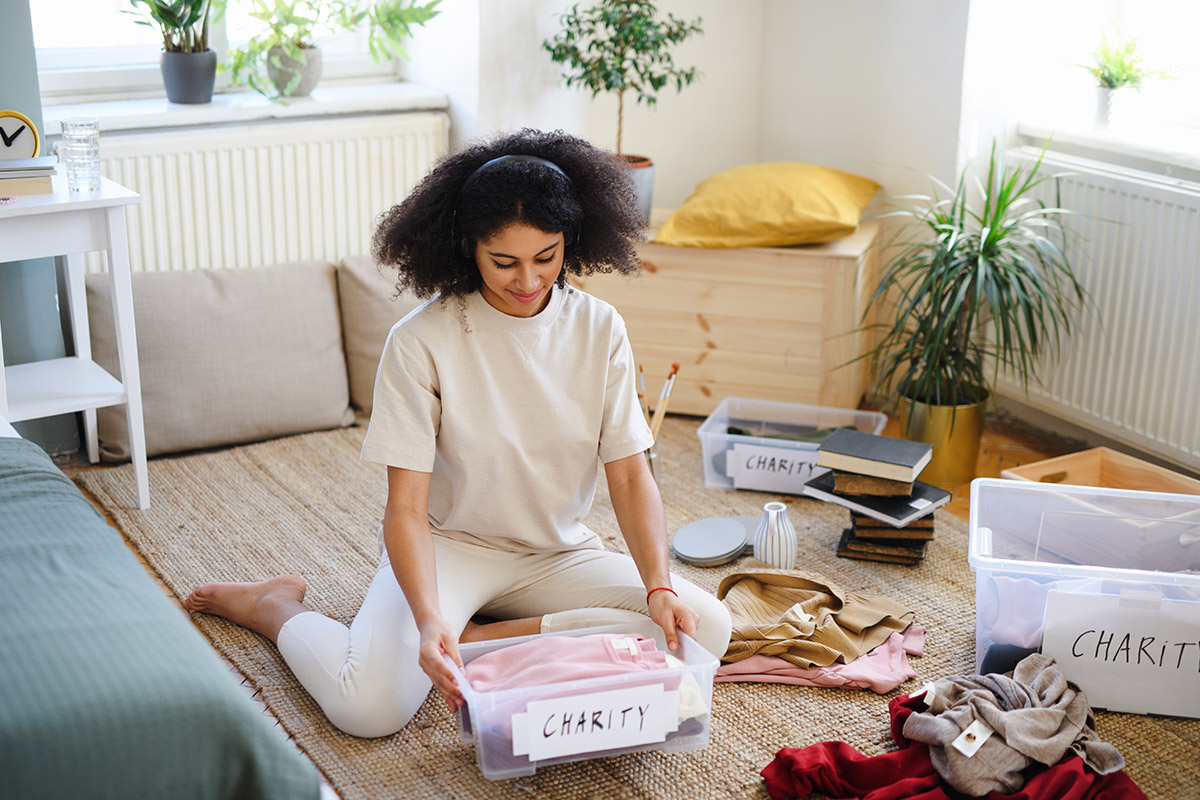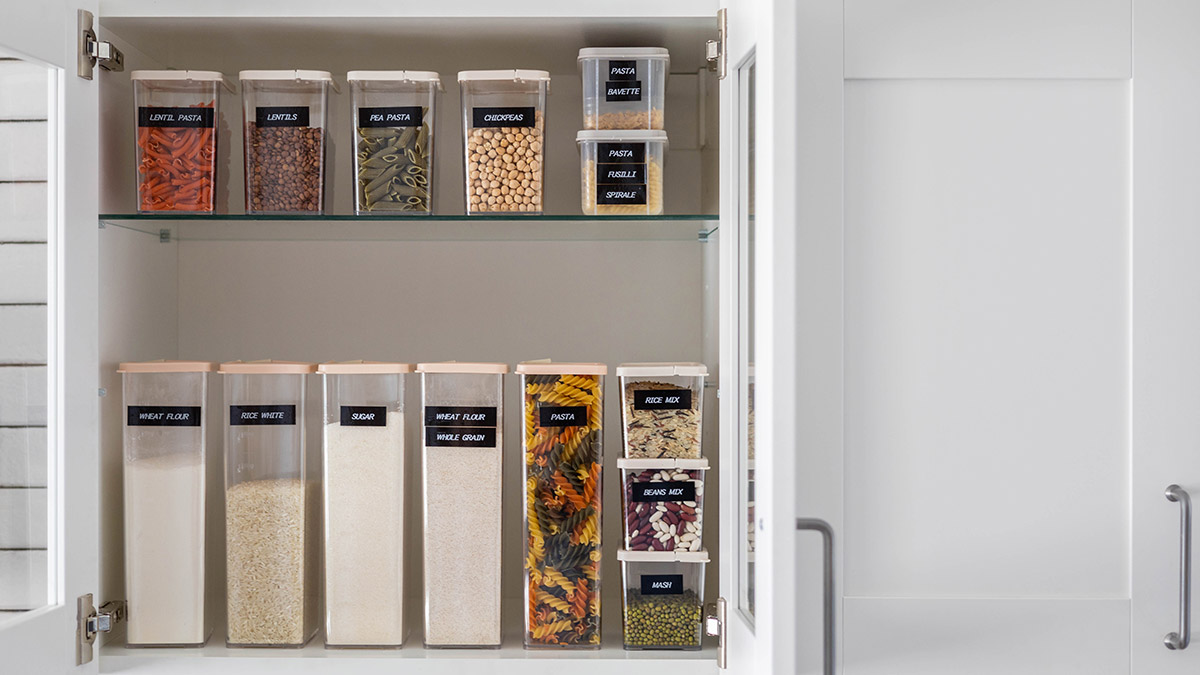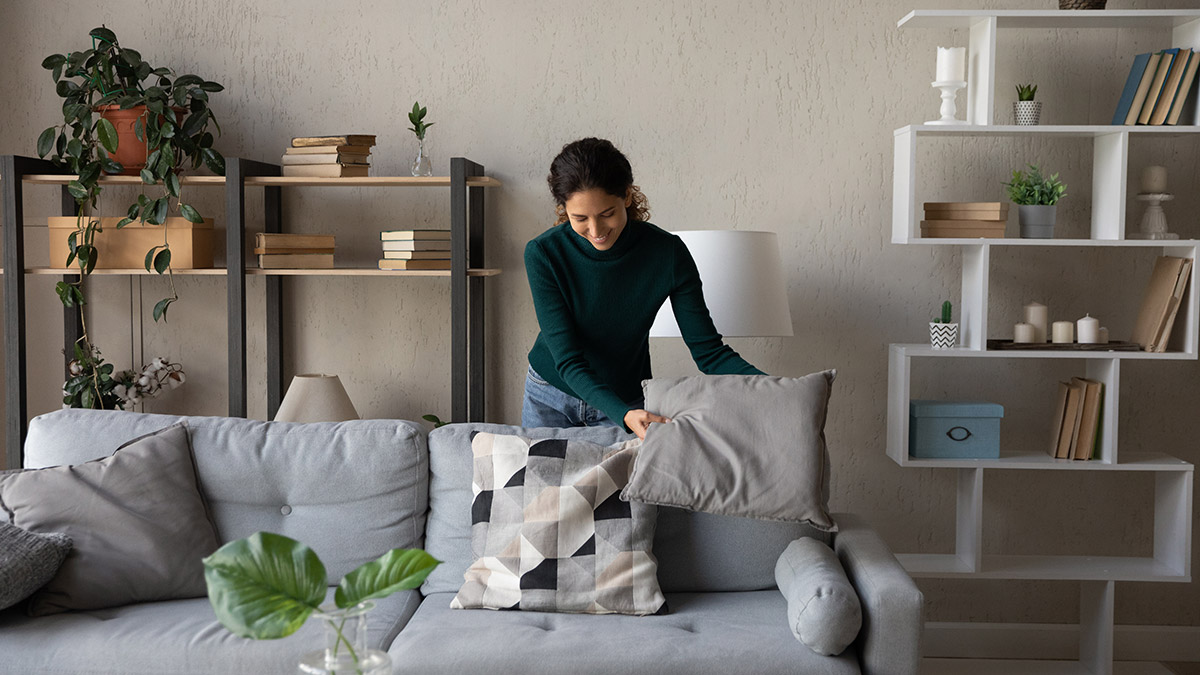Planning a Big Clear Out? These Are the Health Benefits of a Clear, Clutter-Free Space

If you’ve recently stumbled on the #CleanTok trend on TikTok, you’ll know that tidying hacks are having a big moment on the platform.
Thanks to popular cleaning influencers like Kayleen Kelly and Marie Kondo, who are known for transforming disorganised, cluttered homes into gleaming and immaculate spaces, more of us are waking up the benefits of a mess-free environment.
Not only does a clean space look visually pleasing, but research has found that decluttering has some pretty potent health benefits: studies say it can boost your mood, while also easing mental health conditions like anxiety and depression, too.
So, if you’re planning to enter 2024 with a clear home and mind, we’ve gathered some expert tips to shake off the New Year blues and reset your space with a new lease of life. Let’s dive in.

First up, what are the benefits of decluttering?
A ‘big clean’ can be a daunting task, but taking the plunge to live with less ‘stuff’ can actually reward you with more time and better focus. Studies have found that clutter can have a negative psychological effect, and there can often be a subconscious sense of relief in parting ways with things that don’t seve a purpose.
Hester Van Hien, a decluttering professional, says, “Stress contributes to a wide array of mental and physical health issues, and the most significant health benefit of a New Year clearout is reducing overwhelming feelings, especially after a busy time.”
Scientific evidence backs this claim. A 2021 study on 96 students found that those who reported more clutter in their homes had higher levels of the stress hormone cortisol throughout the day compared to people who lived in tidier spaces.
When it comes to the January period, many people resolve to live a healthier lifestyle. One indirect way we can achieve this? Have a strategic clearout. A 2016 study revealed that a cluttered environment, coupled with a low mood, caused participants to be more likely to engage in unhealthy eating behaviours.
Basically, the researchers concluded that it can be harder to control the impulse to order a takeaway, or skip a meal entirely, when your mental health has taken a knock, and your environment is adding fuel to the fire.
“Plus, organising your cupboards helps you to assess your belongings, discard expired or unhealthy food, and make room for better choices,” notes James Cunningham, a health optimisation coach. “Similarly, tidying up your fridge and oven not only enhances food quality but also encourages more frequent cooking from scratch.”
Lastly, most of us can acknowledge that clutter is highly distracting. Too many items around, particularly in work settings, makes it almost impossible to concentrate. This is because studies have found that our brains can focus on only a few things simultaneously, and can easily become overwhelmed by excessive visual stimuli like books, newspapers and piles of clothes.
So, when you’re striving to meet a deadline and you’re surrounded by a mountain of clutter, developing the single-task focus you need becomes far more difficult.
What are the signs that clutter might be becoming an issue for you?
Clutter is basically items that we accumulate in our homes, that we don’t use on a regular basis, but hold on to anyway.
If you find you’re regularly misplacing items, feeling irritated and overwhelmed with your environment, or are actively avoiding spending time at home, it might be a sign you’re reaching tipping point.
Too much clutter can also aggrevate dust allergies too, so health experts warn of an increase in symptoms like headaches and a runny nose when clutter starts to pile up.
It’s worth pointing out here: having clutter in your home and having hoarding disorder are two very different things. Decluttering isn’t a magic mental health bullet and recognising the signs of a more serious issue is important, as it’s always advisable to seek professional help from a GP or therapist.
That said, decluttering can be a simple and inexpensive tool for people who are struggling with low mood at the start of the year, as it helps to create a sense of order, calmness and control. So, if you’re looking for a natural and gentle new year stress-buster, a weekend cleaning project might be useful to you.

6 top tips for decluttering your space
Tidying can be a liberating process, but it can be difficult to know where to start. Try these golden rules for collecting less and living more…
1. Choose an area that doesn’t overwhelm you
When clutter is nudging our stress levels, it’s tempting to go on a cleaning rampage and attempt to tackle the entire house in one. However, this approach can add to the sense of overwhelm, so having a strategy is key.
Trying picking one room to tackle at a time and set clear goals of what you want to achieve. You could begin with a manageable area to build momentum, like a single drawer or a shelf. As you start to see positive changes in your space, it becomes easier to develop a habit of regular tidying and decluttering as you go.
2. Take everything out of your cupboards and drawers
If you’ve watched BBC One’s Sort Your Life Out – the hit show where Stacey Solomon and a team of professionals help families to clear out their cluttered homes – you’ll know that the first step to any spring clean is getting everything out in the open.
“This is so important as only by taking everything out, can you really see what you have,” says Symphony designer Josie Medved. “Give each cupboard and drawer a thorough clean and then only keep what you believe to be of use.
“In the kitchen, for example, throw away any food items that haven’t been used for the past year or which have past their sell by date. Donate any items of crockery and cookware that you don’t use and are still in good condition to a charity shop, family or friends.”
Medved adds that many of us hold onto broken kitchen products, gadgets, utensils and accessories, so the simple act of disposing of these responsibly can free up a surprising amount of space.
3. Make sure everything has a home
“It’s not just what is on your surfaces that matters, but how you organise your home for smooth day-to-day living,” says decluttering expert Lesley Spellman, aka The Clutter Fairy.
Essentially, you won’t feel the benefit of a declutter if your surfaces are clear but you’ve shoved the belongings in a cupboard. “It may give the façade of ‘minimalism’, but you’ll only find chaos underneath.”
Spellman suggests creating ‘end homes’ – specific places within baskets or drawers where each thing lives, so when you are clearing surfaces at the end of the day, nothing gets left in the ‘shove zone’. The more ‘end homes’ you create, the quicker and easier it is to tidy up.
4. Look out for ‘red flag’ words
One reason people tend to hold on to clutter is the fear that it might be useful in the future. If you often catch yourself using phrases like ‘one day’ or ‘just in case,’ it’s likely a sign that it’s time to part with those items.
A good rule of thumb is to ask yourself if you’ve used a belonging in the past two years. If the answer is ‘no,’ it’s highly unlikely you’ll need it in the future – especially if it’s something you can repurchase or borrow from a friend in the unlikely event you need to.
5. Focus on the benefits
Instead of approaching decluttering from a loss mindset, take ten minutes to shift your thinking on the task at hand. Create a vision board of how you’d like your space to look; this can keep you motivated to sort through belongings and build a space you enjoy.
Equally, selling unwanted items on online marketplaces like Vinted and eBay could earn you extra cash for a travel fund, or finance a fresh coat of paint to spruce up your newly decluttered home. Alternatively, you could simply focus on the extra downtime you’ll gain in the future by keeping your space clean and organised with fewer belongings.
6. Adopt the ‘one-in, one-out rule
Finally, the last thing we want is to spend our energy decluttering, only to fill up the space with more low-use items.
An easy way to monitor your belongings in is to adopt a one-in, one-out rule. For every new item brought into your home or space, commit to removing or donating an existing item.
This way, clutter won’t creep in unexpectedly over time and derail your plans to rest and relax at home.


















